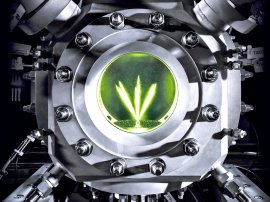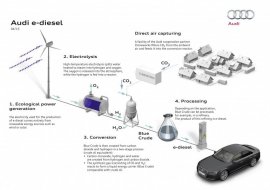
Who manufacturer Audi cars?
 Creating an alternative solution green or carbon neutral fuel to displace gasoline has been the holy grail for researchers for several years. However, while there's been some progress with inventions like battery power and biofuel, most choices are both very costly or perhaps not commercially viable to compete successfully aided by the fossil gas. Today car producer Audi is stepping up toward challenge with a fuel made of carbon-dioxide and liquid.
Creating an alternative solution green or carbon neutral fuel to displace gasoline has been the holy grail for researchers for several years. However, while there's been some progress with inventions like battery power and biofuel, most choices are both very costly or perhaps not commercially viable to compete successfully aided by the fossil gas. Today car producer Audi is stepping up toward challenge with a fuel made of carbon-dioxide and liquid.
Called e-diesel, the gasoline created in collaboration with Dresden-based Sunfire, is made in a laboratory making use of a simple but innovative method. The experts started by boiling water to conditions surpassing 800°C (1, 472°) using a renewable energy source like solar power, wind or hydropower. The ensuing steam had been decomposed into its two constituents, hydrogen and air with the aid of electrolysis. The scientists then transformed the skin tightening and to carbon monoxide. The hydrogen and carbon monoxide were piped into a reactor and put through extreme stress and conditions, to make exactly what scientists call long-chain hydrocarbons. This liquid that Audi identifies as "blue crude" ended up being refined in a similar way to standard crude oil to create e-diesel.
While most associated with the CO2 utilized in producing e-diesel originates from a biogas center, in addition absorbs some from the environment, helping take away the harmful greenhouse fuel from atmosphere. According to the producers, e-diesel has a net-zero carbon footprint. Which means that it uses similar quantity of carbon as it creates. In comparison, every gallon of regular diesel adds 22.38 weight of CO2 whenever burned.
 While this alone should always be enough to convince the entire world to make use of e-diesel, the producers claim just one more characteristic. Based on Sunfire exec Christian von Olhausen, car machines operate much more quietly on e-diesel while emitting less pollutants. Another advantage? It can be combined in with regular fuel for the people cautious with switching entirely.
While this alone should always be enough to convince the entire world to make use of e-diesel, the producers claim just one more characteristic. Based on Sunfire exec Christian von Olhausen, car machines operate much more quietly on e-diesel while emitting less pollutants. Another advantage? It can be combined in with regular fuel for the people cautious with switching entirely.
But radical because it sounds there clearly was one significant issue that nevertheless has to be fixed. Just like others like Britain's Air gas Synthesis, just who made an identical breakthrough in 2012, technology is difficult to measure. Sunfire's Dresden facility is currently creating just 42 gallons of e-diesel daily - scarcely enough to fuel society.
But Sunfire claims it's various this time. They think they could measure and plan to prove it by partnering with Audi to build a bigger plant shortly. Should they succeed, Sunfire estimates e-diesel to retail at 1 to 1.5 Euros ($1.14 - $1.7 USD) per liter, making it competitive with regular diesel. However, critics aren't so certain. They think one of the biggest obstacles to e-diesel becoming a viable option could be the massive amount energy needed seriously to produce it. Experts don't believe renewable resources like solar power and wind should be able to fulfill the demand because that technology is still not quite as sophisticated.
E- diesel is not the initial attempt at making carbon natural gasoline, and it will in no way function as last. But the growth is obviously a step in the right path for clean energy. As Johanna Wanka, Germany's minister of knowledge and study states, "When we can make extensive use of CO2 as a raw product, we shall make a crucial contribution to climate protection and efficient using sources, and place the basics of 'green economic climate' in place."

















